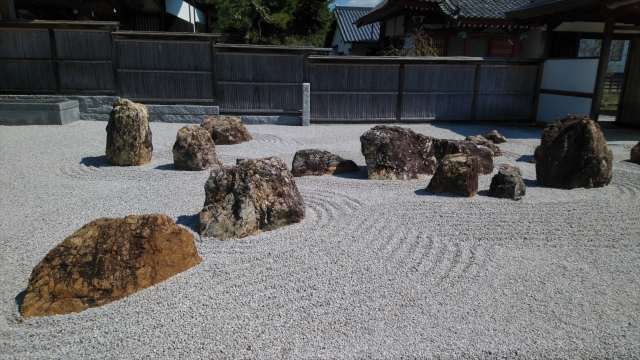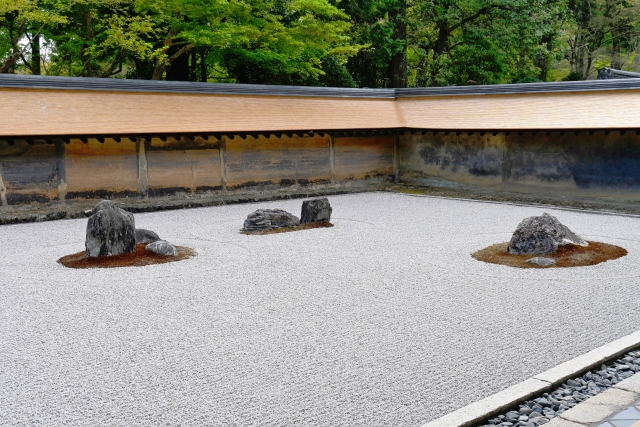When we think of Japan, tranquil landscapes and meticulously designed gardens often come to mind. Among these, Zen gardens stand out as symbols of traditional Japanese culture and aesthetic philosophy. Rooted in Zen Buddhist philosophy, these gardens express not only physical beauty, but also profound spiritual ideas. In this blog, we will discuss the unique elements of Zen gardens, focusing on their relationship to Japanese gardens, the concept of karesansui, the cultural essence of wabi-sabi, and their place in the rich Japanese tradition.
Japanese Garden and Zen Influences
Japanese gardens have a history of more than 1,000 years. These gardens are designed to reflect the harmony of nature and man’s handiwork and feature the incorporation of elements such as water, stone, plants, and pathways. While Western gardens emphasize symmetry and decorative displays, Japanese gardens focus on understatement, natural forms, and creating spaces for contemplation.
The Zen garden is a distinctive feature of Japanese gardens and developed as a place for monks to meditate. Their minimalist design is influenced by Zen Buddhism’s emphasis on simplicity, clarity, and the promotion of spiritual reflection. These gardens are intended as places for reflection and contemplation, not mere decoration.
What is Karesansui?
One of the distinctive elements of a Zen garden is karesansui, which means a garden without water. In this style, elements such as sand, gravel, and stones are used to represent natural landscapes such as rivers, mountains, and islands. Water, commonly found in many Japanese gardens, is symbolically represented using sand and gravel.
The very act of raking sand to create intricate patterns is considered a meditative practice. These patterns are reminiscent of waves and flowing water, while stones symbolize mountains, islands, and other natural features. The careful placement of these elements reflects the Zen principle of finding balance and harmony in simplicity.
A famous example of karesansui is the garden at Ryoanji Temple in Kyoto. This garden features a minimalist design of 15 stones set in white gravel, and its simplicity demands a deeply personal interpretation from the viewer. It embodies the Zen philosophy that there is truth beyond words and formal teachings.

Wabi-sabi philosophy
One of the key concepts in understanding Zen gardens is wabi-sabi. This is a Japanese aesthetic philosophy that values imperfection, transience, and simplicity. Wabi refers to the beauty found in the simple and plain, while sabi emphasizes the beauty found in aging and impermanence.
In a Zen garden, wabi-sabi is reflected in the natural wear of the stones, asymmetrical placement of elements, and subdued colors. Rather than pursuing perfection, a Zen garden celebrates the beauty of imperfection, reminding us of the transience of life while encouraging us to embrace the present moment.

Cultural Property: Zen Garden in the Japanese Tradition
Zen gardens are more than mere physical spaces; they are a cultural legacy that embodies traditional Japanese values and spiritual depth. Historically, these gardens were created for Zen temples and served as an adjunct to meditation and teaching. Over time, their influence spread beyond the lives of monks to aristocratic residences, tea rooms, and even modern homes.
The association with the Japanese tea ceremony is particularly important. Both Zen gardens and the tea ceremony share the principles of wabi-sabi and have the purpose of fostering mindfulness. For example, the path leading to the tea room often includes a small Zen-style garden, creating an atmosphere for the quiet experience of the tea ceremony.
Contemporary Zen Gardens: Universal Appeal
In today’s world, Zen gardens transcend their cultural origins and have become a source of inspiration throughout the world. Its timeless design and universal themes of simplicity, harmony, and mindfulness resonate with people everywhere. Many businesses, parks, and private residences have incorporated elements of Zen gardens as a way to create peaceful environments.
For those who wish to experience Zen gardens firsthand, we recommend visiting historical sites such as Ryoanji Temple, Daitokuji Temple, and Ginkakuji Temple in Kyoto. Creating a small Zen garden in your home is also a meaningful way to bring a sense of tranquility and reflection into your daily life.

Conclusion.
Through their minimalist beauty and profound philosophy, Zen gardens offer a unique window into Japanese culture and spirituality. Through the principles of karesansui and wabi-sabi, these gardens remind us of the importance of simplicity, impermanence, and mindfulness. Whether attracted by their aesthetic appeal or their deeper meaning, Zen gardens offer a quiet refuge in a busy world. By understanding and appreciating these gardens, you can find inspiration to connect with your Japanese heritage and bring a more mindful perspective to your own life.


